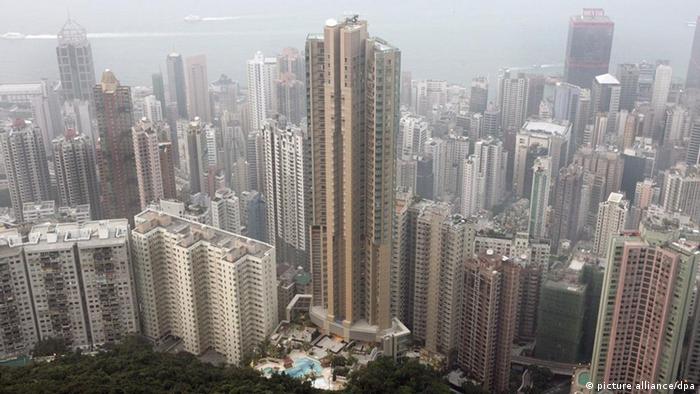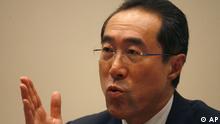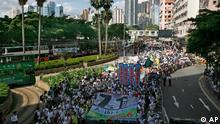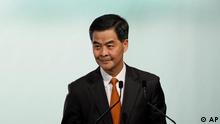Banyan
Wolf in pig’s clothing
Even the most rigged of elections in Hong Kong can be troublesome
Feb 18th 2012 | from the print edition

XI JINPING, China’s leader-in-waiting, has a lot on his plate. Politicians in Hong Kong say that among many tiresome bureaucratic chores before he set off to receive tribute in America was chairing a “co-ordinating committee” on Hong Kong and Macau affairs. Hong Kongers were watching closely, looking for the white smoke over Beijing that would identify their next leader, to replace the outgoing Donald Tsang Yam-kuen, a civil servant under British colonial rule, who in 2005 became Hong Kong’s second post-colonial “chief executive”. No smoke was detected. Unnervingly for some, Hong Kong does not yet know for sure who is supposed to win the “election” to be held on March 25th.
The inverted commas are because this is less an exercise in electoral choice than an elaborate ritual to cloak a decision taken in Beijing. The electorate is a committee of 1,200 voters (out of a population of 7m). Some are politicians; most are chosen by “functional constituencies” to represent sectoral interests. Their main job is to carry out China’s decision on who runs its special administrative region of Hong Kong.
Until recently that seemed fairly straightforward. Beijing, with a few words in the relevant ears, had made its choice clear. It had anointed Henry Tang Ying-yen, who years ago forsook his family textile business for the chief-executive apprenticeship chain, through the Legislative Council and senior government jobs. But as the two-week nomination period for the election opened this week, it seemed likely that two further candidates would receive the endorsement of at least 150 election-committee members, and so qualify as candidates. Chinese officials have indicated that one of these two others is also acceptable.
The other, Albert Ho Chun-yan, is thus a no-hoper. From the Democratic Party, which China dislikes, he is not the party’s most popular member. Even if he were, some Democrats admit, he might flounder, since voters accept that the chief executive should be someone whom China can do business with.
The acceptable new candidate, Leung Chun-ying, known as C.Y. Leung, however, is a cat among the pigeons, or as described in the local press, a wolf (mean and aggressive) to Mr Tang’s pig (complacent and a bit dim). Long regarded with popular suspicion as a “pro-Beijing” politician and closet Communist Party member, he has challenged Mr Tang, and is trouncing him in opinion polls. His lead may well be confirmed as part of a scheme by pollsters at the University of Hong Kong to hold a “virtual” online election two days before the official ballot. In the absence of a clear hint from China, even the most loyal of pro-Beijing parties in Hong Kong does not know which way to jump.
Three explanations are offered for the confusion. One is that Hong Kong has become a skirmish in the factional struggle as China’s leaders vie for influence ahead of their own leadership transition at the Communist Party’s five-yearly congress in the autumn. Mr Tang is favoured by “princelings”, like Mr Xi himself; Mr Leung is said to have the backing of the Communist Youth League from which sprang Hu Jintao, the present party leader.
A second explanation is that Mr Tang is an exceptionally hopeless candidate. Few others could have managed to turn Mr Leung into the popular choice. Many in Hong Kong regard Mr Tang as incompetent and as the undeserving, privileged beneficiary of inherited wealth: the sort of amiable, vaguely trustworthy duffer who would have thrived under the British. It has not helped that he has seemed to take the chief executive’s job for granted—failing to elaborate policies, take part in debates or do anything much at all. “Waiting for the emperor’s yellow robe,” is how Emily Lau, a Democratic Party politician, describes his approach. And efforts by Mr Tang’s campaign to fling dirt at Mr Leung have largely backfired: in response has come a succession of allegations about his own private life and record in office. The latest scandal, about illegal building work at a house owned by Mr Tang’s wife, may even force him to abandon his campaign.
The third possibility is that Mr Tang represents the status quo at a time when many in Hong Kong think the government has done a bad job. They grumble that, since the territory reverted to Chinese sovereignty in 1997, inequality has widened and housing has become even less affordable.
Of late there has also been fury at the perceived abuse of a loophole in Hong Kong’s constitution, which gives all babies born in the territory the right to permanent residence there. In 2010 over 45% of births in Hong Kong—40,000 babies—were to mainland Chinese mothers. Hospitals can no longer cope. More than 130,000 mainland children born in Hong Kong since 2001 have the theoretical right to an education there. Mainlanders are blamed for shortages of baby formula and rising property prices. A decision to make it easier for them to drive here has raised concerns about road manners and congestion. Mr Tang has said it would be good for integration. That is precisely the fear.
An alarming precedent
Opposition to Mr Tang could be seen as an opportunity for China—or as an elaborate pre-scripted farce. To foist Mr Tang on Hong Kong, when it clearly does not want him, might cause real anger. It would also install an incumbent who might struggle for re-election in 2017, when China has promised “universal suffrage”, though how candidates prove their eligibility is yet to be decided. So by securing victory for Mr Leung, China could win kudos for taking popular opinion into account, yet still install a loyal chief.
Letting Mr Leung win, however, would bring its own problems. It would alarm the tycoons China has always seen as its best friends in Hong Kong. Bar a couple of exceptions, these billionaires are all for Mr Tang, perhaps fearing that Mr Leung’s policies might erode the value of their land holdings. A Leung victory would also set an alarming precedent: once China’s anointed ones start losing elections, who knows where it all might end?
****
Yu Jie, 余杰, a Dissident Chinese Writer Continues H...
***
雖然社會上一直有傳言,北京心目中的下屆特首人選是唐英年,但最早表示會當仁不讓的是 ... (三)北京要讓今次選舉增加自由競爭成分,以決定下屆是否可以一人一票選特首。

With elections for the office of Hong Kong’s Chief Executive just weeks away, both its citizens and Beijing are anxious to see who will become the new leader.
With the most important election of Hong Kong just around the corner, candidates vying for the most challenging job on the semi-autonomous island are biting their nails. As Beijing’s wish contradicts the will of Hong Kong citizens, the result of this much-anticipated race is unpredictable.
Elections for the office of Chief Executive of Hong Kong are held every five years. The successor of the incumbent bowtie-wearing Chief Executive Donald Tsang will be decided on March 25 by a 1,200-member Election Committee.
The electoral college, according to Hong Kong pundit Ivan Choy, is made up mainly of the following categories: the industrial, commercial and financial sectors; labor, social services and religious sectors; and the political sector. "Certainly in this combination, pro-Beijing elites or those from the industrial, commercial and financial sectors dominate the entire committee," Choy told Deutsche Welle.

Beijing-backed frontrunner: Henry Tang
Among the 1,200 committee members, Choy estimates that there are approximately 200 democrats. "So we can speculate that candidates trusted by Beijing or having a business background will have an advantage, "he added.
Candidates
China-backed candidate Henry Tang, a wealthy tycoon and former senior government official, would have been "sure to win," had things gone smoothly for him. Unfortunately, he has been embroiled in a sea of scandals, which started last year, when he admitted openly to cheating on his wife. More recently, news of his "forbidden palace" - an illegal construction of a 2,250-square-foot basement with a wine cellar, spa, gym and spacious rooms came to light. Under pressure of the media, Tang made a public apology, saying the construction was his wife’s idea. This irritated Hong Kong citizens even more, who believed Tang had passed the buck to his wife.
The scandals have put Tang’s credibility in question, says Joseph Cheng, a professor of political science with the City University of Hong Kong. "It’s difficult for the public in Hong Kong to trust him anymore. He doesn’t know how to cope with problems. How can he be our leader?"

The citizens of Hong Kong demand universal suffrage
Despite growing calls for Tang to quit the race, he submitted his application on Monday with 387 nominations. Tang’s main rival Leung Chun-ying, the former Executive Council Convenor and former government advisor, formally signed up to run for the office of Chief Executive three days after Tang, with 293 nominations. Leung was the third candidate to submit his nominations. The first was Democratic Party chairman Albert Ho. New People’s Party chairwoman Regina Ip is trying to secure 150 nominations, which is the minimum requirement to enter the race.
The latest poll indicates that among the 3 enrolled candidates Leung has the widest support, whereas Tang has the least, which is bad news for Beijing.
The deadline of application for the top job is on February 29; that leaves Beijing little time to send another candidate to the race.
Direct elections
Cheng argues the whole election process is manipulated by the Chinese central government, as semi-autonomous Hong Kong only has a limited democracy; The island, while having one of the world’s most liberal economic systems, does not grant universal suffrage to its citizens.

Tang's main rival Leung Chun-ying
Every year on July 1, the anniversary of British sovereign handover to China, protesters take to the streets demanding universal suffrage for chief executive and Legislative Council elections. In 2007 Chief Executive Donald Tsang requested Beijing to allow direct elections for the leader of Hong Kong by 2012. Later, Tsang announced that the National People’s Congress planned to allow direct elections in the 2017 chief executive elections.
Choy was not optimistic about the promise of direct elections. "Yes, the Hong Kong government has promised universal suffrage in 2017 but whether or not this will happen, we have no idea yet."
As the promise is not written in black and white, Choy said, "it’ll depend on the new chief executive who will need to work something out with Beijing and the Hong Kong Legislative Council."
For now, the political outlook of the prosperous financial hub is up in the air. Choy said Hong Kong would just have to wait and see in which direction its new leader takes it.
Author: Miriam Wong
Editor: Sarah Berning
沒有留言:
張貼留言